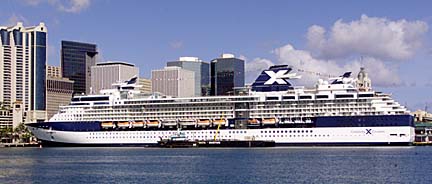
KEN IGE / KIGE@STARBULLETIN.COM
Passengers on Hawaii's cruise ships should undergo security screenings similar to those of air travelers, according to the director of state Civil Defense. The cruise ship Infinity docked at Aloha Tower in May.
Airport-style security
checks urged for
cruise passengers
Hawaii's cruise ship passengers should undergo security screenings similar to those required of air travelers, the director of state Civil Defense told federal officials yesterday.
Brig. Gen. Robert Lee, the state's adjutant general, told U.S. Rep. Neil Abercrombie and other officials that he is concerned with "the disparity in the checkout or the security of passengers for cruise lines as opposed to passengers for aircraft."
The concern comes as Hawaii's cruise ship industry is experiencing its highest visitor numbers ever.
The number of cruise ship passengers coming to Hawaii is up 12 percent for the first five months of the year, from the same period in 2002. According to cruise industry officials, the number of visitors arriving by cruise ships will double by 2005.
Lee and other members of Hawaii's maritime industry discussed port security and defense strategies via teleconference with Abercrombie, who was in Washington, D.C.
Harley Carter, of the U.S. Bureau of Customs and Border Protection in Hawaii, said cruise passengers are not screened individually before they leave or arrive in the islands.
However, cruise line manifests are monitored by security officials.
Lee said the federal government should relocate federal airport screeners to the cruise lines. Dozens of Transportation Security Administration screeners will lose their jobs in Hawaii later this year because of layoffs.
Abercrombie (D-Hawaii) and U.S. Rep. Norm Dicks (D-Wash.), who also spoke via teleconference, agreed with Lee.
Coast Guard Rear Adm. Larry Hereth, who also joined Abercrombie, said an experimental system that screens passengers at airports and transports them to their cruise line's port without a security breach is being tested in Florida.
The process eliminates the need for as many screeners at passenger ships, and Abercrombie said officials will look into whether the system could be expanded to Hawaii.
Officials also expressed concern about the level of security for incoming cargo ships.
Eighty percent of Hawaii's goods are imported, and 98.6 percent of those arrive by ship. One terrorist incident could threaten to cut off the flow of goods to Hawaii and considerably disrupt the state's economy, Abercrombie said.
Recent federal grants for Hawaii totaling $7 million are aimed at preventing terrorist threats by sea. The grants not only went to state agencies, but to private companies interested in pursuing higher security measures.
Gary Moniz, of Matson Navigation Co., which received $805,000 in federal grants this year, said the shipping industry in Hawaii needs to improve its security measures.
Cargo ships are not screened across the board when they come into Hawaii's ports, he said.
Rather, they are screened at random by an employee who reads the ship's list of incoming goods and who may match that list against a container's items.
